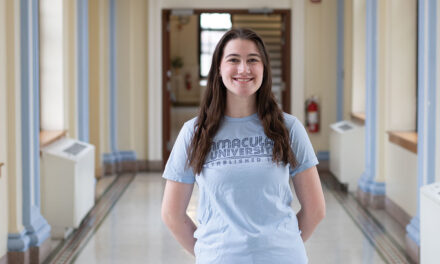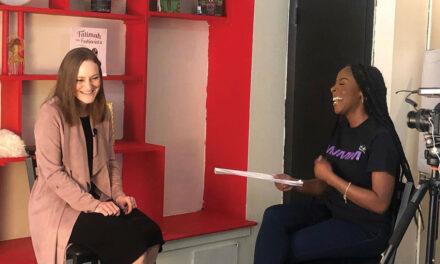Lori De Rea Kolb ’05, ’09 M.A. calls music her “co-therapist,” an additional tool that works alongside her to help clients reduce stress, process painful emotions, practice social skills or ground themselves in the present. She uses a variety of creative therapeutic activities in her work with groups and individuals as a licensed counselor and music therapist.
Six years ago, De Rea Kolb shifted from in-person work to telemental health, primarily to be more available to her two sons. (She likes to joke, “I was doing Zoom before it was cool!”) Her remote work also provides other benefits, such as allowing her to volunteer as president of Immaculata’s Alumni Association and making her services more accessible to clients with barriers, such as a lack of transportation or living in a rural area with few local clinicians.
De Rea Kolb has enjoyed watching her clients grow and thrive and references a group of teenage girls from different socioeconomic groups and geographic areas who meet for online music therapy sessions focused on developing social skills. She often invites the group to share songs related to themes such as strength, resilience, happiness, friendship or love. During the sessions, the group listens to the songs on YouTube together and then discusses why they chose each song.
“It’s such a great opportunity for people to use music to communicate something about themselves and connect with people in a way that feels safe,” De Rea Kolb noted. The girls learn more about each other and practice listening to and accepting people who are different from them. De Rea Kolb helps shape the interactions in the group by affirming the positive responses she sees from each member. She also enjoys learning about new music from her teenage clients, letting them take on the role of the expert. “That’s so powerful and important in therapeutic relationships,” she said.
In her work with individual clients, De Rea Kolb often asks about their preferred genre of music so that she can use that in relaxation exercises. “Somebody might find heavy metal rock music very cathartic!” she said. “It’s never a one-size-fits-all.”
De Rea Kolb leads clients in progressive muscle relaxation or guided imagery and music, prompting them to imagine being in nature and ground themselves in the scene through their senses. She helps clients practice mindfulness, focusing on the present moment rather than the anxieties of the future or the regrets of the past. Making or listening to music requires us to focus and can facilitate mindfulness, she said.
De Rea Kolb appreciates how Immaculata formed and equipped her for her music therapy career. “I had so many positive relationships with my professors,” she said, mentioning Sister Jean Anthony, IHM, a music therapy professor who “was such a charismatic, energetic, beautiful person.” De Rea Kolb also formed a bond with music professor Sister Regina Foy, IHM. “After I left, I would write her letters and send her pictures of my kids.”
A recipient of the presidential scholarship, De Rea Kolb said this financial assistance for completing her undergraduate degree made it possible for her to continue to earn her master’s at Immaculata. “Because of other people’s generosity, I was able to be as successful as I am,” she said.
As president of the Alumni Association Board of Governors, De Rea Kolb seeks to support alumni and help them stay connected to the Immaculata community, whether through attending events, making donations or both.
“I know it can be really hard,” De Rea Kolb says of staying connected to Immaculata, mentioning the stressors she and her classmates experience as they raise children and manage finances. “For different reasons, we come and go in our participation.…But I also know that the way that Immaculata touched people is very real.”
To her fellow alumni who see the positive impact their education has on them, De Rea Kolb says, “Just give a dollar.” College rankings often factor the alumni participation rate—that is, the percentage of alumni who give each year—into their calculations. “It’s about the percentage of participation, not the amount raised,” De Rea Kolb said. So every alum who makes even a small gift increases Immaculata’s standing in college rankings.
De Rea Kolb also recommends designating donations to a specific department or program at Immaculata. She says she has made $20 gifts to the music therapy program. “I knew that they could buy a hand drum for that amount,” she said. “It made me feel like I knew a little bit more where things were going and the impact that I could make.”






